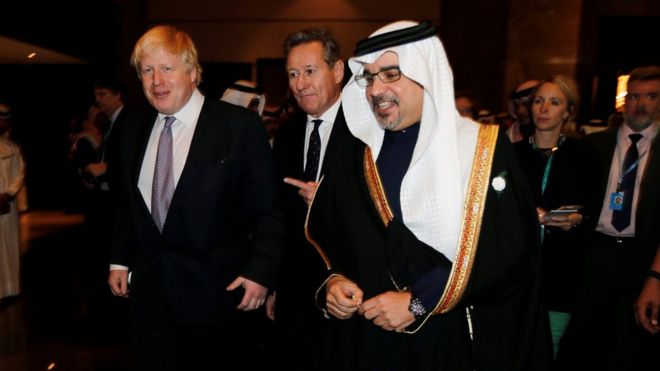Date: Sunday, 11 December 2016
Boris Johnson has spoken of his "profound concern" for people in Yemen and said that "force alone" will not bring stability to the country.
But the foreign secretary said he understood the Saudi need to be "secure from bombardment" from Yemen.
He was speaking in Bahrain a day after being rebuked by Downing Street for accusing Saudi Arabia of engaging in "proxy wars" in the region.
Mr Johnson also said Brexit would allow UK free trade deals in the Gulf.
The foreign secretary made his latest speech at the Institute for Strategic Studies Manama Dialogue on the first leg of his tour of the Middle East.
He made no mention of an appearance in Italy the previous week, where he accused the UK's closest ally in the region, Saudi Arabia, of "puppeteering and playing proxy wars" - as published by The Guardian.
At the event he said: "There are politicians who are twisting and abusing religion and different strains of the same religion in order to further their own political objectives.
"That's one of the biggest political problems in the whole region. And the tragedy for me - and that's why you have these proxy wars being fought the whole time in that area - is that there is not strong enough leadership in the countries themselves."
The prime minister's spokeswoman said after the Rome speech that Mr Johnson's views did not represent the government's position but insisted that Theresa May had "full confidence" in her colleague.
 Reuters Mr Johnson is on the first leg of a tour around the Middle East
Reuters Mr Johnson is on the first leg of a tour around the Middle East
In Friday's address, Mr Johnson said: "I of course understand Saudi concerns about security and the paramount importance of Saudi Arabia securing itself from bombardment by the Houthis" - a reference to the former rebel movement which now controls parts of Yemen including the capital, Sanaa.
He added: "But I must also share my profound concerns, which I'm sure is universal in this room, about the present suffering of the people of Yemen.
"I think we can all agree on this key point, that force alone will not bring about a stable Yemen, and that's why we in London have been working so hard with all our partners to drive that political process forwards."
Scottish Tory leader Ruth Davidson has defended Mr Johnson's previous comments on the region.
She told BBC Radio 4's The Westminster Hour: "I think Boris Johnson was absolutely right about what he said about proxy wars, and about Saudi and about Iran.
"And I agree with his analysis. Now, that might not be the position of the UK Government, but guess what - I am not in the UK Government, and I think he was right."
On Saturday, Labour leader Jeremy Corbyn will call on Mr Johnson to "be brave enough" to back opposition calls to to halt arms sales to Saudi Arabia.
Chris Doyle, director of the Council for Arab-British Understanding, told the BBC Mr Johnson's comments were "by no means the harshest criticism one hears of Saudi Arabia".
He said: "The question is can he now - going out to the Gulf, where we have these great historic relations, very important commercial ones - can he keep those ties warm following the prime minister's recent visit?
"He probably will do, because I don't think these comments will be too controversial."
But Lord Powell, who advised former Prime Minister Margaret Thatcher on foreign affairs, told BBC Radio 4's Today programme: "I don't think it is fair to describe the Saudi policy as 'proxy wars'.
"The Saudis have been very supportive of all efforts against terrorism in the region, against [Syrian] President Assad, against the spread of Iranian influence, and they're long-standing allies, so I think to describe them just as 'proxy wars' is to rather cheapen the very real contribution that they make."
Turning to Syria in his speech, Mr Johnson said a capture of all of Aleppo by government forces would "assuredly be a victory that turns to ashes," because of the hatred felt by millions towards President Bashar al-Assad.
"Remember that two-thirds of Syria is currently outside Assad's control and he is still besieging 30 other areas comprising 571,000 poor, tormented inhabitants," he said.
"Surely to goodness there can be no lasting peace in Syria if that peace is simply re-imposed by a man who has engendered such hatred among millions of his own people."
The foreign secretary also used the speech to reassure the region of the opportunities the UK leaving the European Union will bring when it comes to Free Trade.
"Now is the time for my country to seize the opportunity of leaving the EU," he said.
"We will be there to work for European peace and stability. We'll still be there to stick up for our friends and partners in the Gulf... (where) for the first time since the 1970s we will additionally be able to do free trade deals."
Mr Johnson also said that after 12 years of negotiating the nuclear deal with Iran, partners "must build on this foundation" to build a "better relationship" with Tehran.